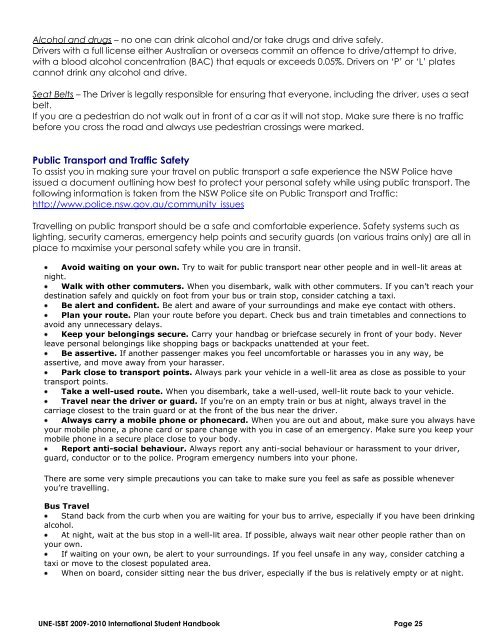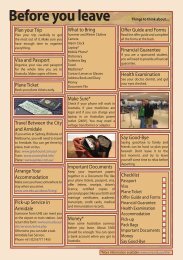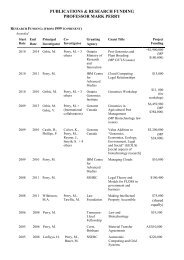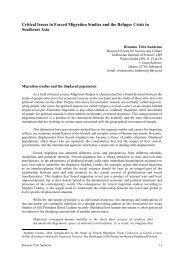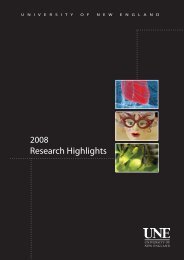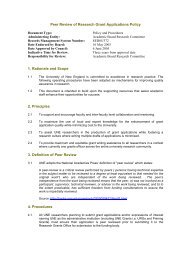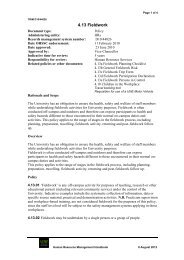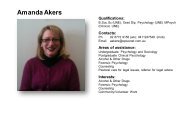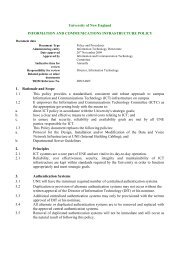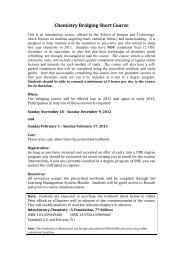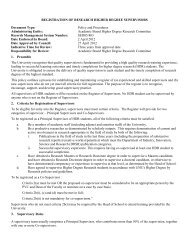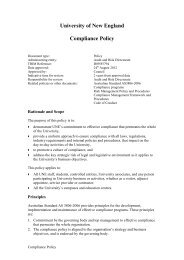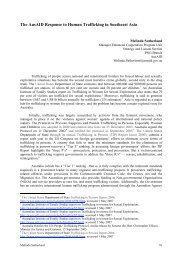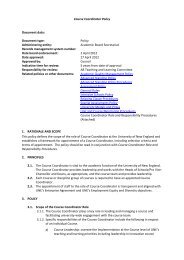International Student Handbook - University of New England
International Student Handbook - University of New England
International Student Handbook - University of New England
You also want an ePaper? Increase the reach of your titles
YUMPU automatically turns print PDFs into web optimized ePapers that Google loves.
Alcohol and drugs – no one can drink alcohol and/or take drugs and drive safely.<br />
Drivers with a full license either Australian or overseas commit an <strong>of</strong>fence to drive/attempt to drive,<br />
with a blood alcohol concentration (BAC) that equals or exceeds 0.05%. Drivers on „P‟ or „L‟ plates<br />
cannot drink any alcohol and drive.<br />
Seat Belts – The Driver is legally responsible for ensuring that everyone, including the driver, uses a seat<br />
belt.<br />
If you are a pedestrian do not walk out in front <strong>of</strong> a car as it will not stop. Make sure there is no traffic<br />
before you cross the road and always use pedestrian crossings were marked.<br />
Public Transport and Traffic Safety<br />
To assist you in making sure your travel on public transport a safe experience the NSW Police have<br />
issued a document outlining how best to protect your personal safety while using public transport. The<br />
following information is taken from the NSW Police site on Public Transport and Traffic:<br />
http://www.police.nsw.gov.au/community_issues<br />
Travelling on public transport should be a safe and comfortable experience. Safety systems such as<br />
lighting, security cameras, emergency help points and security guards (on various trains only) are all in<br />
place to maximise your personal safety while you are in transit.<br />
Avoid waiting on your own. Try to wait for public transport near other people and in well-lit areas at<br />
night.<br />
Walk with other commuters. When you disembark, walk with other commuters. If you can’t reach your<br />
destination safely and quickly on foot from your bus or train stop, consider catching a taxi.<br />
Be alert and confident. Be alert and aware <strong>of</strong> your surroundings and make eye contact with others.<br />
Plan your route. Plan your route before you depart. Check bus and train timetables and connections to<br />
avoid any unnecessary delays.<br />
Keep your belongings secure. Carry your handbag or briefcase securely in front <strong>of</strong> your body. Never<br />
leave personal belongings like shopping bags or backpacks unattended at your feet.<br />
Be assertive. If another passenger makes you feel uncomfortable or harasses you in any way, be<br />
assertive, and move away from your harasser.<br />
Park close to transport points. Always park your vehicle in a well-lit area as close as possible to your<br />
transport points.<br />
Take a well-used route. When you disembark, take a well-used, well-lit route back to your vehicle.<br />
Travel near the driver or guard. If you’re on an empty train or bus at night, always travel in the<br />
carriage closest to the train guard or at the front <strong>of</strong> the bus near the driver.<br />
Always carry a mobile phone or phonecard. When you are out and about, make sure you always have<br />
your mobile phone, a phone card or spare change with you in case <strong>of</strong> an emergency. Make sure you keep your<br />
mobile phone in a secure place close to your body.<br />
Report anti-social behaviour. Always report any anti-social behaviour or harassment to your driver,<br />
guard, conductor or to the police. Program emergency numbers into your phone.<br />
There are some very simple precautions you can take to make sure you feel as safe as possible whenever<br />
you’re travelling.<br />
Bus Travel<br />
Stand back from the curb when you are waiting for your bus to arrive, especially if you have been drinking<br />
alcohol.<br />
At night, wait at the bus stop in a well-lit area. If possible, always wait near other people rather than on<br />
your own.<br />
If waiting on your own, be alert to your surroundings. If you feel unsafe in any way, consider catching a<br />
taxi or move to the closest populated area.<br />
When on board, consider sitting near the bus driver, especially if the bus is relatively empty or at night.<br />
UNE-ISBT 2009-2010 <strong>International</strong> <strong>Student</strong> <strong>Handbook</strong> Page 25


